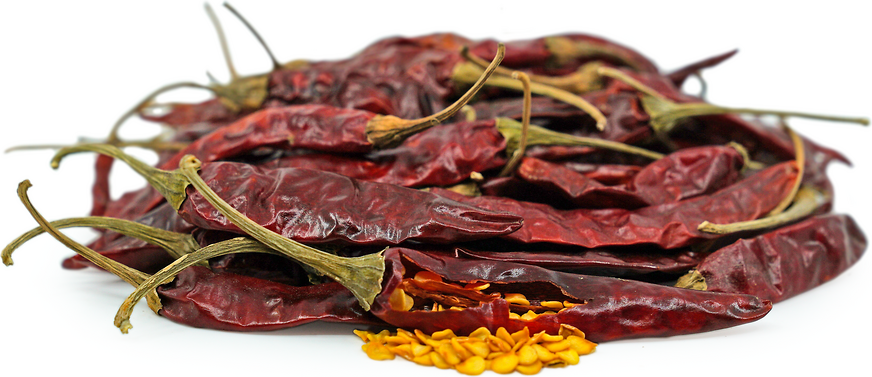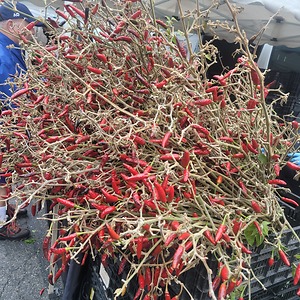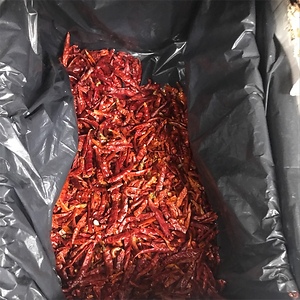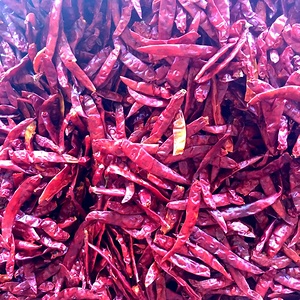


Dried Arbol Chile Peppers
Estimated Inventory, 5 lbs : 11.30
This item was last sold on : 07/13/25
Description/Taste
Dried Chile de Arbol peppers are slender, small peppers, averaging 5 to 8 centimeters in length and 1 to 2 centimeters in diameter, and have an elongated, narrow shape tapering to a distinct point on the non-stem end. The peppers have a flat, wrinkled appearance and retain a bright red coloring when dried, a unique trait as other dried peppers typically turn a shade of maroon or brown. The peppers are also attached to fibrous, woody green stems that should be removed before reconstituting. The pepper’s thin flesh is brittle, dry, and delicate with a crumbling texture, and there are numerous, round and flat, yellow seeds encased in the central cavity. Dried Chile de Arbol peppers develop a concentrated blend of sweet, subtly bitter, smokey, earthy, nutty, and grassy flavors followed by a delayed, intense heat that lingers on the palate.
Seasons/Availability
Dried Chile de Arbol peppers are available year-round.
Current Facts
Chile de Arbol peppers, botanically classified as Capsicum annuum, are a well-known heirloom pepper belonging to the Solanaceae or nightshade family. The thin, bean-like peppers are grown for their complex flavor and fiery heat, averaging 15,000 to 30,000 SHU on the Scoville Scale, sometimes reaching up to 65,000 SHU depending on growing conditions. Chile de Arbol peppers are primarily utilized in their dried form, as drying enhances the pepper’s smokey, earthy, and sweet, subtly bitter flavor profile. They are also one of the few peppers that retain a bright red hue when dried. Throughout its native land of Mexico, Dried Chile de Arbol peppers have become a prominent symbol of Mexican culture and are often depicted in local artwork and as ornamental kitchen decorations, hung in dried bunches known as ristras. Outside of Mexico, Dried Chile de Arbol peppers have also become assimilated worldwide and are favored in Asian cuisine for their similar spice level to cayenne pepper.
Nutritional Value
Chile de Arbol peppers are an excellent source of vitamin A to maintain healthy organ functioning and are a good source of vitamin C to strengthen the immune system. The peppers also contain iron to produce the protein hemoglobin to transport oxygen through the bloodstream, calcium to strengthen bones and teeth, and lower amounts of magnesium and fiber. In addition to vitamins and minerals, Chile de Arbol peppers contain capsaicin, a chemical compound that creates the sensation of heat or spice in the throat and mouth.
Applications
Dried Chile de Arbol peppers have a spicy, earthy taste well-suited as an accent, providing additional flavoring and heat to cooked dishes, sauces, and liquids. The dried peppers should be toasted before reconstituting, as toasting enhances the pepper’s naturally smokey flavor. Once toasted, the peppers are soaked in hot water for 10 to 20 minutes to rehydrate and plump the pods. Reconstituted Chile de Arbol peppers can be chopped, diced, or pureed into sauces such as adobo and enchilada, or they can be combined into red and green salsas for tacos, tamales, roasted meats, and fresh vegetables. Chile de Arbol peppers can also be made into a hot sauce base by fermenting three-parts vinegar to one-part dried chiles for several weeks, or the peppers can be crushed or use whole in pickle brines for a concentrated spicy heat. In addition to sauces and condiments, Dried Chile de Arbol peppers add flavor and heat to soups, stews, and chilis, and the dried pods can also be infused into olive oil, honey, vinegar, liquors, or tea for spicy beverages. In Mexico, Dried Chile de Arbol peppers are popularly incorporated into chile Colorado, a fiery combination of beef covered in a red chile sauce, traditionally served with rice as a filling meal. Dried Chile de Arbol peppers are also incorporated into Caribbean, Asian, and Pakistani cuisine. In Thailand, the dried peppers are used to flavor curries and stir-fries and are also incorporated into chili pastes. Dried Chile de Arbol peppers can also be ground into a powder and utilized as a spice. Chile de Arbol peppers pair well with herbs such as cilantro, parsley, and oregano, aromatics including garlic, onion, and ginger, tomatoes, tomatillos, potatoes, citrus, and meats such as beef, pork, poultry, and fish. The dried peppers will keep 6 to 12 months when stored in a sealed container in a dark location away from direct sunlight.
Ethnic/Cultural Info
Chile de Arbol peppers grown in Yahualica, Jalisco, were granted a Denomination of Origin in Mexico in 2018. The peppers are locally known as Yahualica chile peppers, and the municipality contains a warm, dry, and semi-arid climate, earning it the nickname “the thin lands.” Despite the desert-like climate, the region is filled with mineral-rich soils, contributing to the pepper’s distinct flavor and aroma. Yahualica also produces approximately half of the Chile de Arbol peppers sold throughout Mexico in fresh and dried forms. Across the municipality, there are large family-owned chile ranches that solely grow the slender, spicy peppers. To increase tourism to the region, the Mexican government established the Ruta del Chile Yahualica, a food tourism path, similar to the wine route in Baja California, that travels through the chile ranches of the region to educate visitors on the production, processing, and gastronomy involving Chile de Arbol peppers. Yahualica also hosts the Fiesta de Todos Los Chiles Mexicanos, or the Festival of All Mexican Chiles, in the fall during the pepper’s harvest season. During the festival, vendor stalls line the streets filled with fresh, dried, and powdered Chile de Arbol peppers, and the peppers are also prepared in jams, hot sauces, salsa, and marinades. One of the favorite events of the festival is an annual cooking contest using Chile de Arbol peppers as a signature ingredient. In 2018, the winning dish featured local frog legs with a Chile de Arbol pepper sauce cooked on a hot stone, a traditional cooking method from Yahualica.
Geography/History
Chile de Arbol peppers are native to Mexico, specifically to regions of Jalisco, and have been cultivated since ancient times. The heirloom peppers were first documented in the 16th century by Francisco Hernandez, a Spanish naturalist sent to the New World by the king of Spain to study the plants of Mexico. Chile de Arbol peppers were also introduced into Southeast Asia and later the United States through trade expeditions. Today Chile de Arbol peppers are grown in the regions of Zacatecas, Nayarit, Jalisco, Oaxaca, Chihuahua, Aguascalientes, and Sinaloa in Mexico and are found at local markets in fresh, dried, and powdered form. The peppers are also cultivated worldwide in warm, frost-free climates, especially in New Mexico, Asia, Southeast Asia, Spain, and Northern Africa. Dried Chile de Arbol peppers are sold through online retailers, Mexican and Asian markets, specialty grocers, and farmer’s markets worldwide.
Featured Restaurants
Restaurants currently purchasing this product as an ingredient for their menu.
| Starlite Kitchen | San Diego CA | 619-358-9766 |
| The Santaluz Club Inc - Main Dining | San Diego CA | 858-759-3150 |
| The Santaluz Club Inc - Banquet | San Diego CA | 858-759-3150 |
| Pacifica Del Mar | Del Mar CA | 858-792-0505 |
| The Shout House | San Diego CA | 619-231-6700 |
| Trust Restaurant | San Diego CA | 609-780-7572 |
| Roppongi (IB) | Imperial Beach CA | 858-456-8018 |
| Parkhouse Eatery | San Diego CA | 619 295 7275 |
| Luce | San Diego CA | 619-275-2094 |
| Fish 101 | Encinitas CA | 760-943-6221 |
| Hasta Manana Cantina | San Diego CA | 619-276-6700 |
| Public House 131 | San Diego CA | 858-537-0890 |
| Bar Ella | San Diego CA | 858-808-2286 |
| Ketch Grill and Taps | San Diego CA | 858-268-1030 |
| Catania La Jolla | La Jolla CA | 619-884-5350 |
| JRDN Restaurant | San Diego CA | 858-270-5736 |
| Botanica | San Diego CA | 619-310-6320 |
| Miguel's Old Town | San Diego CA | 619-298-9840 |
| Noble Experiment | San Diego CA | 619-446-0002 |
| Shore Rider | La Jolla CA | 858-412-5308 |
| Special Order | San Diego CA | 619-876-4070 |
| Cove House | La Jolla CA | 858-999-0034 |
| KI's | Encinitas CA | 760-586-8289 |
| Panama 66 | San Diego CA | 619-206-6352 |
| Casero Taqueria | Carlsbad CA | 760-533-4997 |
| Alila Marea Beach Resort | Encinitas CA | 805-539-9719 |
| Stone Brewing World Bistro & Gardens | Escondido CA | 915-861-2297 |
| Portside Pier (Miguels) | San Diego CA | 858-268-1030 |
| Artifact at Mingei | San Diego CA | 619-846-2164 |
| Miguel's 4S Ranch | San Diego CA | 858-924-9200 |
| Miguel's Cocina Coronado | Coronado CA | 619-437-4237 |
| The Shores | La Jolla CA | 858-459-8271 |
| The Glen at Scripps Ranch | San Diego CA | 858-444-8500 |
| The Crack Shack-San Diego | San Diego CA | 619-795-3299 |
| Cal A Vie | Vista CA | 760-945-2055 |
| Fay's Diner and Cafe | San Diego CA | 661-858-8895 |
| Azuki Sushi Lounge | San Diego CA | 619-238-4760 |
| Brigantine La Mesa (Bar) | La Mesa CA | 619-465-1935 |
| Cellar Hand | San Diego CA | 334-689-2388 |
| Fort Oak | San Diego CA | 619-795-6901 |
| Black Raill Kitchen + Bar | Carlsbad CA | 619-454-9182 |
| Gravity Heights Restaurant and Brewery | San Diego CA | 858-551-5105 |
| Le Coq (Bar) | La Jolla CA | 858-427-1500 |
| Saint Mark Golf and Resort, LLC | San Marcos CA | 508-320-6644 |
| Miguel's Cocina Pt Loma | San Diego CA | 619-224-2401 |
| Seneca | San Diego CA | 619-588-2411 |
Recipe Ideas
Recipes that include Dried Arbol Chile Peppers. One










